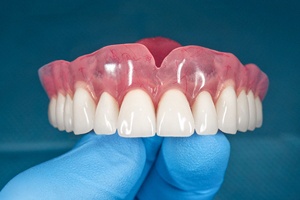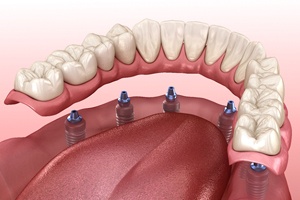Dentures – Waterford, PA
Quickly Restore Your Complete, Confident Smile!
Are you missing several of your beautiful pearly whites, or even an entire arch? Then you already know how an incomplete smile can make enjoying many of your favorite things in life more difficult. What’s more, not only do missing teeth influence your ability to eat, speak, and smile confidently, but they can increase your risk of oral and overall health concerns. Thankfully, we can help you quickly restore your complete, confident smile with dentures! Give us a call today to schedule your consultation with Dr. Dinesh Patel for a full or partial denture!
Who is a Good Candidate for Dentures?

Dentures are an excellent option for people who are missing several, most of, or all of their teeth. Depending on the location and number of teeth that are missing, a customized plan is made for each patient so their smile will be both comfortable and functional. For anyone with existing oral health issues, like periodontal disease or tooth decay, these will need to be treated before moving forward in the process of getting dentures. It is important that your restored smile is both aesthetically pleasing and in good health!
Types of Dentures

There are a couple different options out there when it comes to dentures. During your initial consultation with Dr. Patel, it will be determined which one is the best option to restore your smile.
Partial Dentures
If you’re missing several teeth, partial dentures may be an excellent choice for you. A partial consists of one or more custom-made replacement teeth that are set into a gum-colored base. They’re carefully designed to fit perfectly around and between your remaining teeth to seamlessly fill in the gaps like puzzle pieces. Instead of relying on suction, partial dentures are held in place with metal clasps that wrap around your natural tooth structure for a secure fit.
Full Dentures
A full set of dentures is a classic way to replace an entire arch of missing teeth. Your custom-made prosthetic will feature replacement teeth that are just the right size, shape, and color for your unique mouth. They’ll be set into a gum-colored base that’s designed to fit perfectly on top of your gum ridge. The natural suction provided by the close fit combined with your cheek and tongue muscles as well as a little bit of denture adhesive all keep your new smile firmly in place.
The Benefits of Dentures

There are numerous benefits of replacing your missing teeth with a partial or full denture. Here are just a handful of them:
- Dentures are customized for your individual smile
- Partial and full dentures are made to look like natural teeth
- They allow you to eat more wholesome, nutritious foods
- Dentures maintain your face’s structure
- They are a cost-effective way to replace missing teeth
- Dentures are easy to maintain
Understanding the Cost of Dentures

As with any dental treatment, one of the main things people want to know about beforehand is the cost. What’s important to understand is that there is no fixed price for dentures, as they need to be personalized to suit each patient’s situation. However, there are a few key factors that can directly affect how much you’ll pay, and you can learn more about them below.
Factors that Affect the Cost of Dentures

The three most important things that influence the cost of dentures are:
- Preparatory Procedures: If a patient needs gum disease treatment or a few teeth removed before they can be fitted for a denture, this will add to the overall price.
- Type of Acrylic: Acrylic is the material used to form the base of a denture, and it is typically dyed to match the color of the gums. Different types of acrylics are available, each of varying strength and quality.
- Type of Teeth: Denture teeth can be made from acrylic or porcelain, each providing a different level of strength and aesthetics, and both have their own price point (porcelain tends to be more expensive because it is more durable and natural-looking).
Are Dental Implant Dentures More Expensive?

Yes, dental implant dentures are more expensive than traditional ones up front, and that’s because fitting a patient for one and placing it is much more complicated. Rather than the denture sitting directly on the gums, it is anchored to the jawbone using four to six dental implants.
This makes the denture much more stable compared to a regular prosthetic, meaning a patient will be able to speak more clearly as well as enjoy a wider variety of foods without having to deal with slipping. They tend to give patients more confidence as well because they never need to worry about their teeth being out of place.
It’s important to highlight that while regular dentures tend to last about five to seven years on average, implant dentures have been shown to endure much longer. The implants themselves have about a 30-35 year lifespan, and they also support the jawbone from within, which prevents the natural changes in the mouth that cause regular dentures to lose their fit. In the end, implant dentures often cost less than regular ones over time thanks to the money a patient saves on maintenance and replacement.
Does Dental Insurance Cover Dentures?

In most cases, yes, dental insurance can be used to cover dentures. They are often categorized as “advanced restorative care,” which means they usually receive 50% coverage. This can vary from plan to plan, of course, so be sure to go over your policy with our team before committing to treatment.
Other Options for Making Dentures Affordable

For patients who don’t have insurance, Summit Family Dentistry is happy to offer flexible financing through CareCredit. With it, you can stretch out paying for your prosthetic across several months with little to no interest. It can be used for both a regular denture as well as an implant denture. You can learn more about CareCredit and even sign up for a plan right through our website. Just go to this page, scroll to where it says “Financial Policy,” and click the button that says “Apply for CareCredit.”
Denture FAQs

Dentures have successfully treated tooth loss for generations; however, it’s normal to have a few concerns. Don’t worry, we will explain everything during your consultation to feel confident about the road ahead. In the meantime, here are the answers to a few frequently asked questions to calm your nerves.
Can I sleep with my dentures?
No one wants to be caught without their teeth, but you’ll need to establish the habit of taking them out before going to bed. After first receiving your new teeth, your denture dentist will instruct you to wear them for a full 24 hours, even while you’re sleeping. From then on, you’ll need to take your dentures out nightly. They restrict the circulation in your gum tissue, which can lead to irritation and quicker ridge resorption. You will give your gums time to rest and receive the nutrients they need to get ready for the next day. Not to mention, your mouth is dark and moist, creating the perfect environment for harmful bacteria to grow. This can lead to bad breath, oral plaque, and even an increased risk of pneumonia. You will keep your mouth and body healthy by removing your dentures at night to give them a thorough cleaning. Don’t forget to soak them in a denture rinse overnight to neutralize any odor-causing bacteria.
Can I use regular toothpaste to clean my dentures?
Although they will mimic your natural teeth, you don’t want to use toothpaste to clean your dentures. Hard-bristled toothbrushes and abrasive toothpaste can leave small scratches on your dentures, which can trap bacteria and food particles that can diminish the beauty of your new smile. It can also lead to unpleasant odors and shorten the lifespan of your dentures. Instead, it’s better to use a soft-bristled toothbrush and hand soap or mild dishwashing liquid to clean your dentures after every meal.
Do upper dentures always cover the palate?
You might have heard your food doesn’t taste the same when replacing the upper teeth. This is a common problem associated with a denture that covers the upper palate; however, there are multiple types of prosthetics. As an alternative to a traditional upper denture, we can create one that has a horseshoe shape, so it won’t cover your palate. It will look like the denture used for a lower arch or implant-supported options. We’ll explain all types suitable for you during your denture consultation to choose a style you’ll be satisfied with.
Can I kiss with dentures?
Yes! You can still pucker up for a kiss, but it may take a little practice. Your dentures won’t contain any nerves, like your real teeth. As a result, you might accidentally bump your new teeth against your partner’s. No one wants to end up at an emergency dentist from a kiss. It’s best to be cautious when kissing until you adjust to your new smile. Be sure to kiss gently, so you don’t dislodge your denture in the process.
